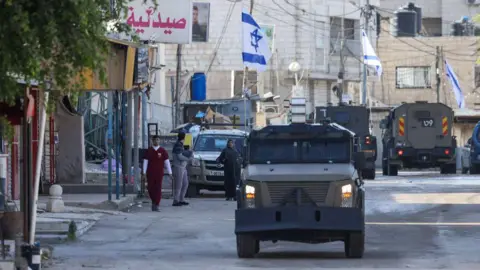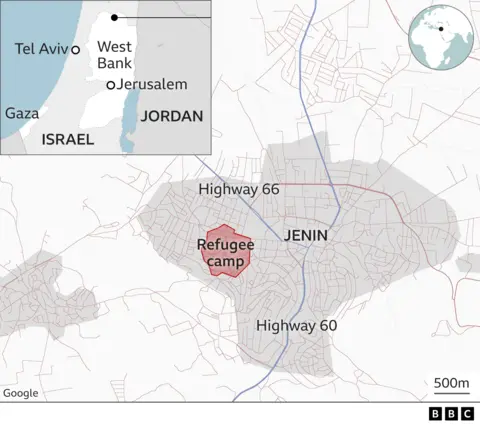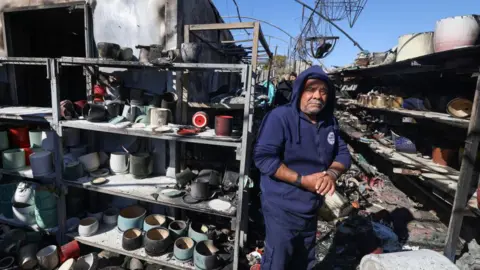 AFP
AFPEight Palestinians were killed and 35 injured by Israeli forces during a major operation in Jenin in the occupied West Bank, the Palestinian Health Ministry said.
Palestinian media reported that there had been a series of airstrikes as large numbers of troops entered the town and its refugee camp, supported by drones, helicopters and armored bulldozers.
The Israeli Prime Minister said he had launched a “vast and significant” operation to “defeat terrorism” in Jenin, long considered a stronghold of Palestinian armed groups.
It comes three days after the start of a ceasefire in Gaza and highlights the threat of further violence in the West Bank, where suspected Israeli settlers also went on a rampage overnight.

“What is happening is an invasion of the camp,” Jenin Governor Kamal Abu al-Rub told AFP, adding: “It happened quickly, Apaches (helicopters) in the sky and military vehicles Israelis everywhere.
The official Palestinian news agency Wafa, citing local sources, said Israeli forces were “completely besieging” the Jenin camp and that armored bulldozers had dug up several streets.
He also cited Jenin government hospital director Wissam Bakr as saying that three doctors and two nurses were among those injured by Israeli fire.
Palestinian security personnel reportedly withdrew from some of their positions around the Jenin refugee camp before the arrival of Israeli forces.
Brigadier General Anwar Rajab, spokesman for the Palestinian security forces, told AFP that Israeli forces had “opened fire on civilians and security forces”, leaving several injured.
A statement from Israeli Prime Minister Benjamin Netanyahu said the Jenin operation – nicknamed “Iron Wall” – was a “further step in achieving the goal we have set for ourselves: strengthening security” in the West Bank.
“We act methodically and decisively against the Iranian axis wherever it extends: in Gaza, Lebanon, Syria, Yemen and (the West Bank) – and we are always active.”
Israel accuses Iran of smuggling weapons and funds to Hamas, Palestinian Islamic Jihad and other armed groups in the West Bank to foment unrest.
Israeli media cited a military source as saying the operation’s objectives were to preserve its “freedom of action” in the West Bank, dismantle armed groups’ infrastructure and eliminate imminent threats. The source also indicated that the operation would continue “as long as necessary.”
The Prime Minister of the West Bank-based Palestinian Authority, Mohammed Mustafa, condemned the raid, saying it was the latest in a series of “aggressive Israeli measures” against Palestinians in the West Bank, according to Wafa.
Hamas and Palestinian Islamic Jihad have both called on West Bank Palestinians to step up their attacks on Israel in response to the Jenin operation.
There have been a number of Israeli military operations in Jenin.
And recently, PA security forces carried out a controversial weeks-long operation against armed groups, including Hamas and PIJ, in an attempt to reassert their control.
There has been a surge in violence in the West Bank since Hamas’ deadly attack on Israel on October 7, 2023 and the subsequent war in Gaza.
Hundreds of Palestinians have been killed as Israeli forces intensified raids, saying they were trying to stem deadly Palestinian attacks on Israelis in the West Bank and Israel.
 AFP
AFPIn another development in the West Bank, overnight, dozens of masked Israeli extremists attacked Palestinians in two villages east of Qalqilya, Jinsafut and al-Funduq, burning Palestinian homes and cars and destroying property.
At least 21 Palestinians were injured, the Palestinian Red Crescent said. Two Israelis were also shot dead, apparently when an Israeli police officer opened fire while responding to the violence.
The Israeli military said it was investigating the incidents, in which it said Israeli civilians “provoked riots, burned properties and caused damage.” He also said they threw stones and attacked Israeli security forces.
This came just as new US President Donald Trump announced the lifting of sanctions against Israeli settlers accused of carrying out attacks in the West Bank.
The rollback of the Biden administration’s sanctions targeting radical Israelis could signal the direction the new White House will take, which is expected to be more tolerant of Jewish settlement expansion.
Far-right, pro-settler Israeli Finance Minister Bezalel Smotrich welcomed the US decision. In an article on X, he praised Trump’s “unwavering and uncompromising support for the State of Israel.”
Meanwhile, Palestinian officials have condemned the policy change. “Lifting sanctions against extremist settlers encourages them to commit more crimes against our people,” the Palestinian Foreign Ministry said in a statement.
The mayor of al-Funduq, Luay Tayyam, told the BBC: “It’s like a green light to the settlers, saying, ‘Go ahead, do whatever you want. You will not be persecuted.’ »
“So they’re happy with that news. And I think it was a big boost for them last night. They feel encouraged by that.”
The attack in al-Funduq occurred in an area where three Israelis were killed in a shooting earlier this month. This is the latest in a long series of settler attacks that have significantly accelerated since the start of the war in Gaza.
According to the Israeli anti-settlement group Peace Now, in 2024, settlers have also established 59 new outposts, without permission from the Israeli government. This was more than double the number from the previous year – which was also a record year for the establishment of settlement outposts.
Israel has built about 160 settlements housing some 700,000 Jews since it occupied the West Bank in the 1967 Middle East war. The settlements are considered illegal under international law, although Israel disputes this – all like the previous Trump administration.



